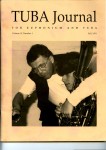 Author’s note (1991)
Author’s note (1991)
It is impossible to capture the essence of such a powerful and influential teacher as Arnold Jacobs in print, let alone in the limited space available here. However, insight into the techniques and philosophies of this great teacher can prove a valuable complement to the precious few texts written by or about Mr. Jacobs. As with any teaching method, there is a danger of misinterpretation by those who would seek to superficially garner a nugget here and there without understanding the underlying principles and objectives. Perhaps that fear is what has kept the eloquent Mr. Jacobs from publishing a text of his own. Despite this risk, I feel that the tremendous value of this information, and its scarcity in print, justify this outline of his pedagogy. The contents of this paper are based upon my participation in two separate master-classes with Mr. Jacobs (one in South Florida, and another one at Norhtwestern University); reading of nearly everything available about or by him; attending Northwestern University for three years when he was a faculty member, and subsequently a retired faculty member; and discussions of his teaching techniques with many of his students and other musicians both in and out of the Chicago area. This article is dedicated to the memory of Arnold Jacobs.
Arnold Jacobs is primarily known as an excellent performer. In his long and illustrious performing and recording career with the Chicago Symphony Orchestra, with its brass quintet, and as a soloist, he has touched millions of listeners over several generations. Others may know Mr. Jacobs chiefly through his theories on breathing and pulmonary function. To medical supply companies, professionals in medicine, and scholars alike, he is a gifted investigator and knowledgeable scientist. Despite these impressive credentials, it could be said that his greatest achievement has been through his teaching? With unparalleled success, and encompassing all types of wind instruments, Arnold Jacobs’ students are some of the finest wind players in the world. Many attribute all or a large part of their success to Mr. Jacobs, a man many consider to be the greatest brass teacher of all time.
Though most widely known for his breathing expertise, Mr. Jacobs is quick to point out that music comes first, last, and always. He commonly draws one conclusion from his experience teaching students from all over the world,: “They lack artistry.” He believes that training a musician should not merely be the training of an instrumentalist, but the training of a great artist as well. Emphasizing to students that sound is their medium, Mr. Jacobs encourages them to become expressive and interpretative or to become “story tellers of sound.” By providing them with goals of excellence, creative imagery and an excellent set of ears, he sets for his students the highest standards possible. Perhaps the most important musical concept is the latter part of his famous phrase “Wind and Song”, where students are encouraged to sing the music in their heads while they are playing, as they would like to hear it played.
 Close your eyes and imagine the greatest tuba sound in the world. As you describe it, words such as “full”, “warm”, “dark”, “round”, or “clear”, may come to mind. Now imagine this “world’s greatest tubist” playing the phrase that sits on the music stand before you. Continue to hear this player’s version as you play it, concentrating on that version, rather than yours. This, in a nutshell, emphasizes Mr. Jacobs’ belief that musical thought and tone should be the impetus for performance, and that methodology and technique are, of necessity, their by-product. Thus by providing an excellent musical stimulus of the ideal performer, many other aspects of playing will fall into place.
Close your eyes and imagine the greatest tuba sound in the world. As you describe it, words such as “full”, “warm”, “dark”, “round”, or “clear”, may come to mind. Now imagine this “world’s greatest tubist” playing the phrase that sits on the music stand before you. Continue to hear this player’s version as you play it, concentrating on that version, rather than yours. This, in a nutshell, emphasizes Mr. Jacobs’ belief that musical thought and tone should be the impetus for performance, and that methodology and technique are, of necessity, their by-product. Thus by providing an excellent musical stimulus of the ideal performer, many other aspects of playing will fall into place.
Advocating that the finest quality is what one should intend, Mr. Jacobs insists that habits should be formed based upon excellence. By using imitation, and the creative imagination of excellence, these high goals are established. “Play it like Bud Herseth would”, is a common command Jacobs gives to trumpet students. This begs them not only to recall an excellent example, but also to apply their imagination of it to the piece of music at hand. By flooding their mind with this excellent example, they cannot help but improve what comes out of the bell. “Is that the best note you can play?”, he sincerely asks another student. Then he urges them to pretend that every note is worth one hundred dollars, and instructs them not to play any more ten-cent notes.
Noting that the middle of a trumpeter’s long tone is excellent, Mr. Jacobs encourages the student to imagine and then achieve that excellence at the beginning of the tone as well. Thus, he emphasizes the sound and not the attack noise, saying that a short note should be just like a slice out of the middle of a long tone. Insisting that extra MUSICAL attention be given to the notes at the beginning of phrases, Mr. Jacobs deals in terms of the ideal sound and imagined goals rather than tongue placement or function. Always speaking in terms of quality tones, and not long tones, Mr. Jacobs espouses creating excellence in the middle register and expanding it to other registers of the horn.
given to the notes at the beginning of phrases, Mr. Jacobs deals in terms of the ideal sound and imagined goals rather than tongue placement or function. Always speaking in terms of quality tones, and not long tones, Mr. Jacobs espouses creating excellence in the middle register and expanding it to other registers of the horn.
Many of Arnold Jacobs’ students recount similar stories of spending an entire lesson perfecting a single phrase, with the explanation that a performer must pay attention to every note in a phrase as well as the big picture. Though the listener senses the phrase direction, the performer must attend to every note to shape this. By setting this high standard, elevating the students’ expectations and helping them focus on the stimulus of the goal in their brain, Mr. Jacobs inspires them to excellence in the brain even if There is mediocrity in the lips. With his guidance, the two will eventually match.
Part 2 Song and Wind: The Pedagogy of Arnold Jacobs, by David William Brubeck
“When David Brubeck’s, ˜The Pedagogy of Arnold Jacobs’ first came out, I was at Mr. Jacobs’ home. He was very impressed about it and had me read it on the spot. As usual, Mr. Jacobs was correct, it was an outstanding article that I eventually quoted half a dozen times in ˜Arnold Jacobs: Song and Wind”. David Brubeck did a fantastic job and this is a must-read for anyone interested in the teachings of Arnold Jacobs.” Brian Frederiksen
 Originally published in the TUBA Journal, Fall 1991 Volume 19, Number 1.
Originally published in the TUBA Journal, Fall 1991 Volume 19, Number 1.
Photo of Arnold Jacobs courtesy of www.windsongpress.com
C. 1991 David William Brubeck All Rights Reserved. davidbrubeck.com
